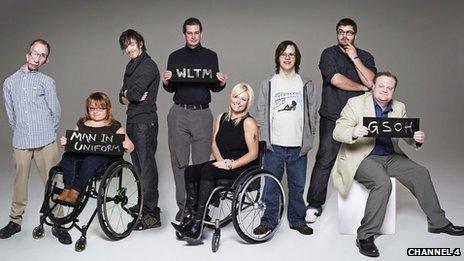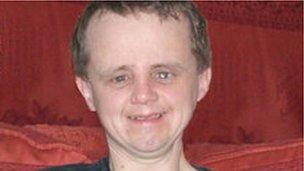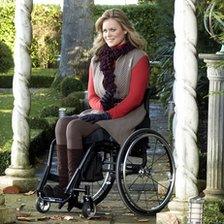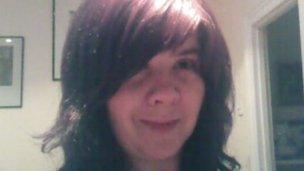The dating world of disabled people
- Published

The participants in Channel 4's The Undateables
The world of disability and dating is being examined in new series The Undateables. But what are some of the dating complexities that disabled people face, asks Damon Rose.
It goes without saying that you can't lump all disabled people together when discussing this most personal of all subjects.
The barriers to dating, and having a successful relationship, are different depending on your disability and circumstances.
Adrian Higginbotham, 37, is blind and explains that for him, the difficulties start with making first contact, the starting point for any relationship.
"You can't do that casual walking into a room and making eye contact thing. You can't smile at someone you have seen twice before walking down that same street."
Anybody blind doesn't know if the person sitting on the train next to them is the one they sat next to yesterday or if they're someone who works in their building three floors up.

Adrian Higginbotham, who is blind, says dating difficulties start with making first contact
They can't have nodding relationships that could go further.
"A blind person I know used to deliberately wear odd shoes to try and get people to comment on it to see if anyone would say to him: 'Do you realise you've got odd shoes on?,'" says Higginbotham. "He was trying to engineer a social interaction, though I hope he was being slightly tongue-in-cheek."
When thinking about the basic blocks of relationship building, little can be more basic than choosing who you spend your time with. But not everyone has that choice.
Channel 4's The Undateables features many people with learning difficulties and introduces us to a dating agency, Stars in the Sky, which helps put people in touch with each other.
Lydia Jones is one of their chaperones - she makes sure that clients get to the date venue safely and that they meet the right person, but she also helps tackle lulls in conversations.
"Quite often, people with learning disabilities are forced into sharing relationships with people who they don't have a choice about being with," says Jones. "Their peers are the ones they meet at a day service or in supported living accommodation."
Stars in the Sky is a small charity which has organised more than 180 dates since starting in 2005. So far it has been the catalyst for one marriage, one same-sex ceremony, three engagements and about 15 longer-term relationships.
Physical access gets top billing in terms of importance for wheelchair user Shannon Murray, a model who was the face of a recent publicity campaign for Debenhams. She doesn't intend to get caught out by a date who might see her struggling up steps and be put off before the date even starts.
"I keep a shortlist of restaurants and bars on my Blackberry which don't just have accessible loos but also have completely flat entrances. On a first date I am worried that guys come to the table believing I'm needy or not independent. I need to be completely in control."
She feels that some of her relationships may have failed because of "over-independence" and her drive to never show vulnerability.
"I've gone too far the other way; it's hard to get that balance right," she says.

Shannon Murray says physical access is paramount on dates
Disability campaigners believe changes to benefits under the Welfare Reform Act will make things harder. In a recent entry for the Liberal Conspiracy blog, campaigner Lisa Egan suggests the changes make it harder for disabled people to have relationships.
Employment Support Allowance (ESA) will now be taken away from someone if they have a partner who earns more than £7,500, she explains.
"It's going to mean that someone like me who's not currently in a relationship will never be able to live with a partner, because after one year of being together I would lose my income. I am one of the most determinedly independent characters on the planet. I could never put myself into a situation where my partner was expected to 'keep' me."
The Undateables programme has been vigorously discussed on social media over the last few weeks but mostly because the title is a provocative one. No-one likes to think that they're "undateable" but it is accepted that, for various reasons, being disabled can decrease the chances of romance.
Though many disabled people are happily married or dating with no difficulties, others do face a complex range of reactions. Those with a disability date a variety of people - both disabled and non-disabled. But occasionally there can be strange attitudes from the latter.
Lisa Jenkins, 38, had been set up on a date with a friend of a friend who didn't know she had cerebral palsy.
"We entered a bar and he walked straight down the steps in front of us. I tried to walk down but I just couldn't, there was no rail to hold onto."
Jenkins's date asked if she was all right, at which point she had to tell him about her cerebral palsy.
"I could see the change in his face; he was immediately less attracted to me. It was quite interesting really.
"I've had guys who fancied me but thought there was something wrong with fancying me. You're supposed to fancy the birds who are 5ft 9in and blonde, after all."
Then there is just downright weirdness.
One potential date told Jenkins: "I've always fancied some kinky sex." The strangeness of his attitude was clear. "He considered me slightly freaky," Jenkins explains.
A 2008 poll for the Observer, external found that 70% of those surveyed would not have sex with a disabled person.
Murray, who is in her 30s, agrees that sex is often at the heart of what people are thinking and, after 20 years of being disabled, still seems taken aback by the comments she receives from would-be dates.

Lisa Jenkins, who has cerebral palsy, has encountered unusual attitudes
"When I was a teenager, guys would offer me a drink and ask me straight away: "Can you still have sex?'"
When internet dating became popular, many disabled people took to it thinking they could hide their disability. But it was soon appreciated that if you want to actually date someone, you can't hide behind your laptop forever.
A new complexity developed - should you be upfront and tell people you are disabled, or let them get to know your real personality first and reveal the disability later?
Murray has done both. "When I first started road-testing online dating, I couldn't decide whether to declare my disability or not. In the end, because I was nervous, I didn't say, and any photos were just waist up."
Eschewing specialist disabled sites, Murray used only mainstream dating services.
"Guys would get in touch and we'd email back and forth, and I'd wait until there was a definite chemistry and then say look I've got to tell you something. Only one guy ever backed out at that stage, saying that was slightly more baggage than he could deal with ... which was honest at least, if a little narrow minded."
But Murray wanted to try another more direct approach.
"I did it again about a year later and this time I made sure you could see the chair in the photo. In my profile I put something light-hearted like - if their interests were hiking up Everest I wouldn't be able to join them but I'd wait around at base camp and try to keep the tent warm.
"Once I put my disability 'out there' I expected less interest, but I got more response than when hiding the chair. I went into the top five most liked women of the week."
The Undateables starts on Channel 4 on Tuesday 3 April at 21:00 BST.
Here is a selection of readers' stories on dating and disability.